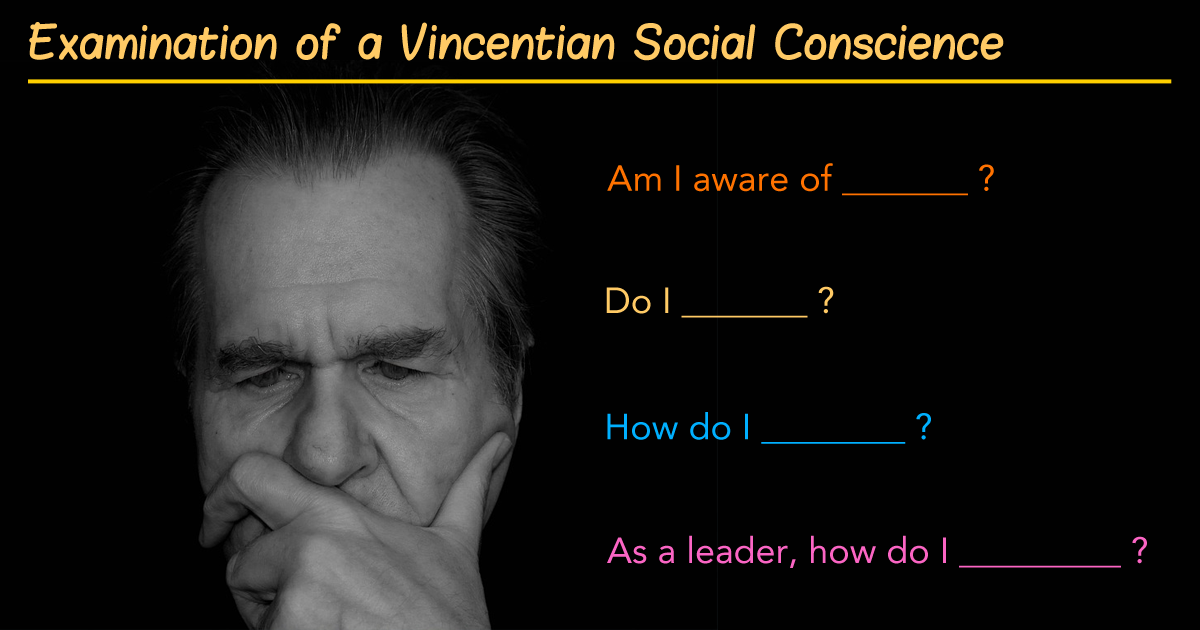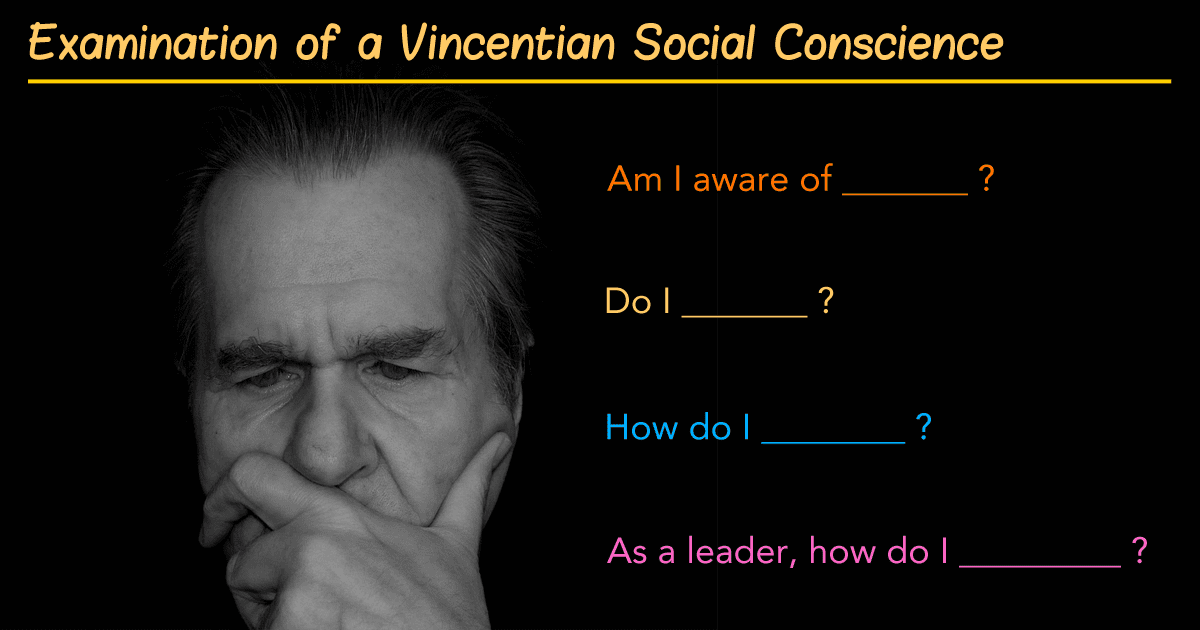Examination of a Vincentian Social Conscience

In his blog, A Voice of the Poor – Looking at life through the lens of Catholic Social Teaching, Jack Murphy presents various resources available that “help for our beliefs and to compare our actions to the standards of our faith.” These include the Ignatian Spiritual Exercises (including the Daily Examen), Forming Consciences For Faithful Citizenship and Examination of Conscience in Light of Catholic Social Teaching by the U.S. Bishops. Here, he offers a list of social concerns included in the position papers approved by the Society of St. Vincent de Paul:
| Affordable Housing (Italicized text from the Position Paper)
“Vincentians visit individuals and families with no homes, families on the verge of homelessness, and families who live in hazardous and substandard conditions. The Rule of the Society reminds us of our mission. “No act of charity is foreign to the Society.” Councils and Conferences, recognizing the need for safe and affordable housing, seek to provide emergency shelter, transitional housing, permanent housing, and rent/mortgage assistance.”
|
| Education
“Vincentians visit unemployed and low-skilled, minimum wage workers struggling to make ends meet. They see young single mothers with poor literacy skills who have no idea how they will ever get off public assistance. Vincentians visit the incarcerated; many lack basic education and now, with a criminal record, the hope of landing a legitimate job diminishes even further.”
|
| Health Care for the Poor
“Members of the Society of St. Vincent de Paul see people with diverse medical needs in home visits and in special works activities. They visit seniors who cannot afford to pay for both food and prescription medicines. They visit families where children do not have simple inoculations or access to basic medical care for childhood illnesses. Vincentians see adults in pain with ailments for which there would be relief were they able to afford basic medical aid. Some Councils have taken steps to work with community groups to open medical clinics for the poor and to assist with prescriptions. Yet much more is needed.”
|
| Homelessness
“Vincentians encounter the suffering Christ in countless individuals and families who are homeless or on the brink of homelessness. Struggling for mere existence, they are caught in a vicious cycle with no quick-and-easy solutions.”
|
| Human Trafficking
The Society of St. Vincent de Paul reaffirms our adherence to Catholic Social Teaching, whose foundation is the inviolable dignity of every person from the moment of conception to natural death. We call for care and protection of victims of trafficking. We call for rigorous local, national and international efforts to identify and punish individuals and businesses that trade in persons. We call for greater efforts to eliminate the root causes of poverty. The weak and vulnerable must be protected from this evil.
|
| Hunger
Hunger manifests itself in many way. Hunger affects the productivity and health of workers running on empty. Elderly pensioners scrimp to try to get by. Hungry children are affected with poor concentration, behavior difficulties, and low achievement scores. With adequate nourishment serious physical, mental, and developmental consequences can be prevented. As followers of Jesus, the words of our Savior make obvious our responsibility to those who hunger and thirst. The Society of St. Vincent de Paul must be a Voice of the Poor.
|
| Immigration
Vincentians are frequently in contact with individuals and families who have relocated to the United States. Some refer to immigrants as “illegals” while others use the label “undocumented.” Regardless of the name given: All are children of God. As Catholics we know that the human dignity of every person regardless of legal status must be preserved. We also know that any policy adopted to address the situation of newcomers, whether identified as refugees, undocumented aliens, or legal residents newly residing in the US, must be mindful of the common good.
|
| Predatory Lending
Research shows that the poor pay higher prices for goods including mortgages, auto loans and even basics, such as groceries, insurance, and financial services. When funds are needed, alternative finance services, such as payday lenders, check cashers, money transmitters, title lenders, rent-to-own providers, pawn shops and tax preparation services that provide refund anticipation loans, proffer funding options.
|
| Restorative Justice
America’s criminal justice system is broken. The US Catholic Bishops came to this conclusion…. According to their statement: Responsibility, Rehabilitation, and Restoration: “All those whom we consulted seemed to agree on one thing: the status quo is not really working—offenders are often not rehabilitated, and many communities have lost their sense of security. All of these committed people spoke with a sense of passion and urgency that the system is broken in many ways. We share their concern and believe that it does not live up to the best of our nation’s values and falls short of our religious principles.”
|
| Self Sufficient Wages
As Vincentians, we believe in living gospel values. As the largest Catholic lay organization in the United States, it is essential that we support Catholic teachings. I urge you to ensure that those employed by the Society in the United States be afforded the greatest possible respect and a wage that reflects our values of creating self-sufficiency for whomever we serve. It is up to the local Council Board to investigate and determine a sufficient wage that creates self-sufficiency for our employees.
|
| Diversity
We are committed to providing a place at the table for all, a place that offers all with opportunities to participate and grow. Each of us who serve, work, volunteer or are associated with the Society of St. Vincent de Paul, USA have a personal responsibility to advance diversity and inclusion. While this national level emphasis is important in the work we do, it is meaningless without follow-up at the Regional, District, Council and Conference level. Therefore, we call on all our Vincentians, employees, associates and volunteers to take advantage of resources provided within and outside the Society that will help achieve this end. (proposed Position Paper, scheduled for approval vote at this year’s Annual Meeting)
|
| Civility (not a position paper but an important topic of reflection)
“Let us learn, first of all, to defend our belief without hating our adversaries, to appreciate those who do not think as we do, to recognize that there are Christians in every camp, and that God can be served now as always! Let us complain less of our times and more of ourselves. Let us not be discouraged, let us be better.” Blessed Frederic Ozanam
|
Jack Murphy serves on the Society of St. Vincent de Paul National Board of Directors and is a Diversity, Systemic Change, Advocacy Goal Leader. To view the entire blog post, please visit: https://svdpvop.wordpress.com/







0 Comments